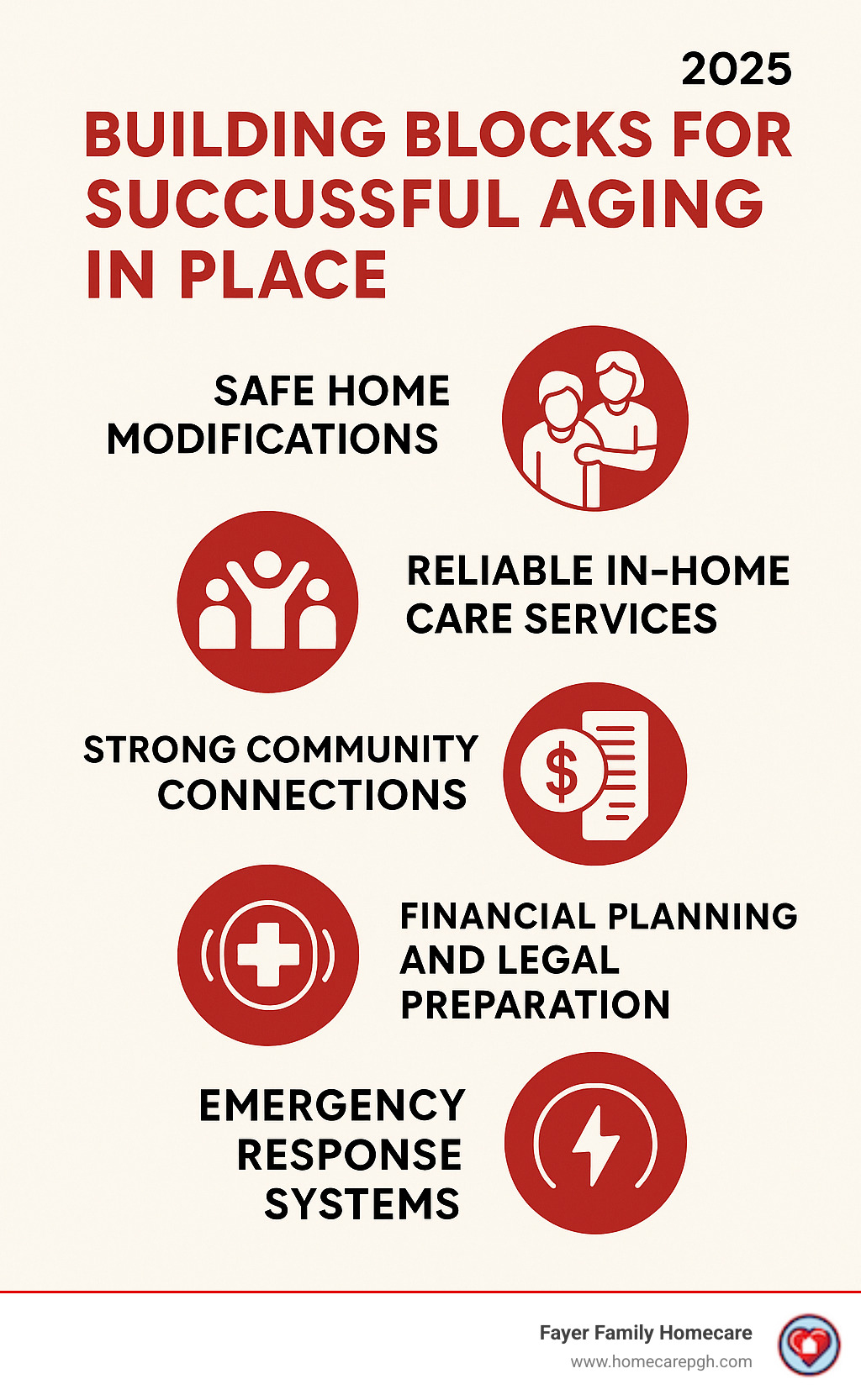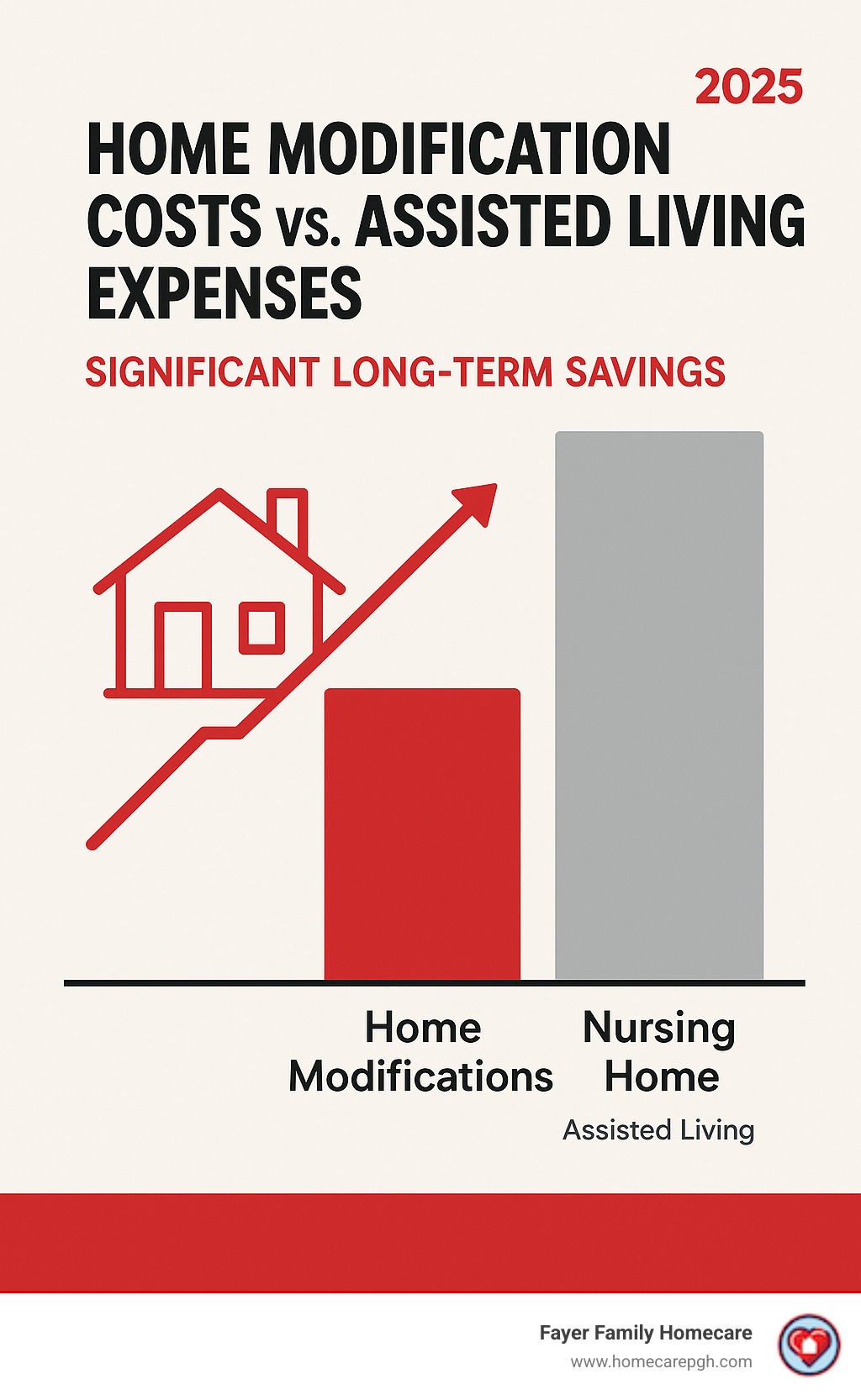
February 27, 2025
Choosing the Best Home Care Services in Pittsburgh, PADiscover top home care services in Pittsburgh PA. Ensure quality, independence, and safety for your loved ones with expert guidance.
Read Article
Aging in place Pittsburgh is becoming the preferred choice for families seeking compassionate care for their loved ones. Simply put, it means staying in your own home and community as you age, rather than moving to a facility.
Quick Guide to Aging in Place Pittsburgh Services:
The numbers tell a compelling story. Almost 20% of Allegheny County residents are 65 or older - that's higher than the national average of 17%. Even more striking: 88% of adults want to live in their homes for as long as possible.
Pittsburgh offers world-class healthcare, strong community networks, and affordable housing costs that make home modifications accessible. Plus, initiatives like Age-Friendly Greater Pittsburgh are actively working to support seniors who want to stay put.
However, 39% of Pittsburgh seniors live alone, and many face unique challenges from our historic housing stock and hilly terrain. That's why having the right support system matters more than ever.

There's something magical about the phrase "home sweet home" that resonates deeply with Pittsburgh families. It's not just about the physical structure - it's about the sense of place that comes from decades of memories, neighborhood friendships, and community ties.
In Pittsburgh, our neighborhoods have character, from the tree-lined streets of Shadyside to the historic charm of the South Side. These community connections aren't just nice to have - they're essential for healthy aging.
The CDC defines aging in place as "the ability to live in one's own home and community safely, independently, and comfortably, regardless of age, income, or ability level." It's a simple concept with profound meaning - staying where your heart is while getting the support you need.
88% of adults want to live in their homes for as long as possible. Pittsburgh stands out as an ideal place for aging in place Pittsburgh families. Our city is part of the WHO Global Network for Age-Friendly Cities and Communities, with Age-Friendly Greater Pittsburgh partnering over 120 organizations in the 2022-2025 Action Plan.
Allegheny County has the second largest concentration of older adults in the United States, behind only Palm Beach, Florida. This means we have the infrastructure, services, and expertise that comes from experience.
Cost savings top the list for most families. While the average nursing facility in Pittsburgh costs $91,000 per year, home modifications like stair lifts range from $2,200 to $16,000 - a one-time investment versus ongoing expenses.
Autonomy and independence remain intact when you stay home. Your home, your rules.
Deep social roots matter more than many people realize. Pittsburgh's strong community networks provide natural support systems that can't be replicated elsewhere.
World-class healthcare access gives Pittsburgh families confidence, with renowned medical institutions like UPMC and Allegheny Health Network offering specialized geriatric services and home-based care programs.
Reliable public transportation through Port Authority's bus system and ACCESS paratransit services helps seniors maintain mobility and independence.
Pittsburgh's beautiful historic row houses often feature steep staircases that can become mobility barriers. Many homes built in the 1800s and early 1900s weren't designed with accessibility in mind.
Winter weather adds complexity, and the caregiver shortage affects our region. With 39% of Pittsburgh seniors living alone, finding reliable support becomes critical. The University of Pittsburgh's Healthy Home Lab is actively researching these challenges, using an actual 1860s Pittsburgh house as a living laboratory.
These challenges aren't impossible - they're simply factors to plan for with the right modifications, support services, and community connections.

Only 10% of U.S. homes are currently ready to support someone aging in place. But making your Pittsburgh home safer often involves straightforward modifications that won't break the bank.
The smart approach starts with a professional home assessment. The University of Pittsburgh's Healthy Home Lab has been pioneering research on these challenges. Working with a Certified Aging in Place Specialist (CAPS) gives you access to professionals who understand both safety and style.
Universal design principles create spaces that work better for everyone while looking great.
Bathrooms deserve special attention since most home accidents happen here. Grab bars near toilets and in showers, non-slip flooring, improved lighting, walk-in tubs or roll-in showers, and raised toilet seats transform bathing from a worry into a pleasure.
Kitchen modifications include pull-out drawers in lower cabinets, lever-style faucets and cabinet handles, side-by-side refrigerators, and improved task lighting.
Throughout bedrooms and living areas, focus on adequate lighting with easy-to-reach switches, pocket doors or wider doorways, and railings on both sides of staircases.
Exterior modifications include ramps, improved outdoor lighting, handrails on steps, and automatic door openers.
A stair lift installation ranges from $2,200 to $16,000. Wheelchair ramps cost $3,500 to $5,000, while bathroom modifications range from $300 to $15,000. Even home elevators, running $30,000 to $60,000, become reasonable when compared to alternatives.
Nursing facilities average $91,000 per year in our area, while assisted living runs about $43,000 annually. Those are ongoing costs, year after year. Your home modifications are one-time investments that keep paying dividends.

Even extensive home modifications typically cost less than one year in a care facility. The key is planning ahead and making modifications gradually.

Successful aging in place Pittsburgh is about building a support network that keeps you thriving. At Fayer Family Homecare, we provide specialized care for individuals who are aging and those with Dementia or Alzheimer's, offering companionship, supervision, and recreational activities while ensuring cleanliness and comfort.
The Area Agency on Aging serves as your "front door" to services for Allegheny County residents 60 and older. Their SeniorLine at 412-350-4234 connects you with care managers who can help steer available programs.
Personal care services include help with bathing, dressing, medication reminders, and mobility assistance while maintaining dignity.
Companionship services provide meaningful conversation, hobby assistance, and social connection that keeps spirits high.
For families dealing with memory challenges, specialized dementia and Alzheimer's care includes cognitive stimulation activities, behavioral management, and safety supervision. Learn more about how our customized care services can be custom to your specific needs.
Respite care gives family caregivers much-needed breaks, preventing caregiver burnout.
Pennsylvania's Help at Home (OPTIONS) program provides homemaker services for eligible seniors, while LIFE Pittsburgh offers comprehensive services combining medical care with social services.
Meals on Wheels delivers more than just food - volunteers provide daily check-ins and social connection. Housekeeping support maintains a safe, clean environment. Our housekeeping services focus on maintaining comfortable, safe environments that support independence.
Transportation solutions include Port Authority's bus system with senior discounts, ACCESS paratransit service for door-to-door transportation, and volunteer driver programs for medical appointments.
The key is finding the right combination of services that work for your situation while maintaining independence and quality of life.

Staying connected isn't always easy as we age, but aging in place Pittsburgh doesn't mean aging alone. Social isolation can be as harmful to your health as smoking 15 cigarettes a day, which is why Age-Friendly Greater Pittsburgh has made social engagement a top priority.
The partnership between Age-Friendly Greater Pittsburgh and the JCC of Greater Pittsburgh creates intergenerational events where seniors and younger folks come together, sharing stories and learning from each other.
Today's smart devices are designed with seniors in mind. Voice-activated lights and thermostats eliminate fumbling for switches. Smart speakers can remind you to take medications, play music, or call family members with simple voice commands.
Personal Emergency Response Systems (PERS) can detect falls automatically and include GPS tracking. Tablets with large screens make video calls with grandchildren enjoyable. Telehealth platforms let you visit with your doctor from home.
Medication reminder systems range from simple pill dispensers with alarms to smart systems that notify family members, providing peace of mind for everyone.
Pittsburgh's senior centers offer everything from balance classes to social gatherings. Volunteering keeps you connected while giving you purpose. Hobby and interest groups create natural friendship opportunities through shared interests.
Tele-friend programs pair seniors with volunteers for regular phone calls - having someone who calls just to check in can brighten your entire week.
Successful aging in place Pittsburgh recognizes that independence doesn't mean isolation. With the right mix of technology, community programs, and social connections, home truly can be the best place to thrive.
Planning for aging in place Pittsburgh means getting your financial and legal ducks in a row. There are more resources available than most families realize.
Pittsburgh has a significant veteran population - 21% of local seniors are veterans. If you or your spouse served, you may qualify for VA benefits covering home modifications, caregiver support, and healthcare services.
Pennsylvania's Medicaid waiver programs can cover home care services instead of nursing home care for eligible seniors. There are often waiting lists, so apply early.
For homeowners with significant equity, reverse mortgages can provide funds for home modifications and care services, though they require careful consideration.
Pennsylvania offers various home modification grant programs for eligible seniors. The Area Agency on Aging can walk you through current programs and applications.
LIFE Pittsburgh provides comprehensive medical care, social services, and support for frail elderly individuals who want to stay home. Since 1999, LIFE Pittsburgh has served over 1,500 older adults in Allegheny County.
Property tax relief programs for senior homeowners can make a real difference on fixed incomes. The costs and options in private home care vary widely, but understanding funding options helps you make informed decisions.
Legal and financial planning should happen early - ideally before any cognitive decline begins.
Essential legal documents include your will and testament, durable power of attorney for finances, healthcare power of attorney, living will or advance directive, and HIPAA authorization forms.
Financial planning involves evaluating long-term care insurance, reviewing Medicare supplement options, optimizing Social Security benefits, and estate planning.
The Area Agency on Aging SeniorLine (412-350-4234) can connect you with resources for both financial planning and legal assistance. For additional guidance on health insurance counseling, Allegheny County offers resources to help you understand your coverage options.
Good planning creates the best possible future for yourself and your family, allowing you to focus on enjoying your home and community.

Creating a successful aging in place Pittsburgh plan requires a systematic approach:
Step 1: Community Assessment - Understand your neighborhood's walkability, services, and safety features.
Step 2: Home Safety Audit - Walk through each room or invite a Certified Aging in Place Specialist (CAPS) for professional insight.
Step 3: Choose Your Services - Consider both current needs and future possibilities, from occasional housekeeping to comprehensive care support.
Step 4: Secure Funding - Explore resources through SeniorLine at 412-350-4234, from veteran benefits to Medicaid waivers.
Step 5: Integrate Technology - Start with simple solutions like voice-activated lights or medication reminders.
Step 6: Review and Adapt - Reassess annually or when circumstances change.
The Area Agency on Aging at 2100 Wharton Street serves as your gateway to local resources. Age-Friendly Greater Pittsburgh brings together over 120 organizations working to make our region more welcoming for all ages.
Local Age-Friendly Neighborhoods programs in communities like Clairton, Coraopolis, and the Hill District show how grassroots efforts create more supportive environments.
Significant changes in mobility or health status often trigger plan updates. Caregiver fatigue, seasonal challenges like winter weather, and subtle signs like difficulty managing medications or increased social isolation all signal the need for adjustments.
Watch for changes in medication management, falls or near-falls, social isolation, or confusion about familiar tasks. Regular check-ins with healthcare providers and family members help you stay ahead of needs rather than react to crises.
Begin with a Certified Aging in Place Specialist (CAPS) who can spot potential hazards you might miss. Your Area Agency on Aging can connect you with qualified evaluators who understand Pittsburgh's unique housing challenges. Many home modification companies offer free initial assessments.
The SeniorLine at 412-350-4234 is your gateway to resources. Meals on Wheels provides affordable meals and daily check-ins. Pennsylvania OPTIONS offers homemaker services for eligible seniors. Transportation assistance programs help with medical appointments, while utility assistance and Medicare counseling services provide additional support.
Technology is powerful but works best supporting human care rather than replacing it. Smart home devices can remind you to take medications and detect falls, while telehealth services enable remote doctor consultations. However, technology can't notice subtle changes in your well-being or provide emotional support.
At Fayer Family Homecare, we see technology as a valuable partner in care, but never a replacement for the human connection vital for emotional well-being. The sweet spot combines both - using technology for safety while maintaining human contact through family, friends, and professional caregivers.
Pittsburgh is perfect for aging in place, with strong neighborhood connections, world-class healthcare, and infrastructure built to support our large senior population. With almost 20% of our population over 65, Pittsburgh has the expertise and resources to make aging in place successful.
The numbers tell an encouraging story, but what really matters is preserving what makes life meaningful - your morning routines, favorite spaces, and community connections. These aren't small things - they're the foundation of a life well-lived.
At Fayer Family Homecare, we see this every day. Our experienced caregivers understand that successful aging in place isn't just about safety and health - it's about maintaining dignity, independence, and joy. Whether you need companionship, specialized dementia care, or help with daily activities, we're here to make staying home truly fulfilling.
The beautiful thing about aging in place is that it's never too early or too late to start planning. Pittsburgh offers the perfect combination of community spirit, innovative resources, and caring professionals to make "home sweet home" last a lifetime.
Ready to explore how aging in place Pittsburgh can work for your family? Contact us today to discuss your unique situation and create a personalized plan that keeps you thriving in the comfort of your own home. Because at the end of the day, there's no place like home - especially when you have the right support to make it work.
